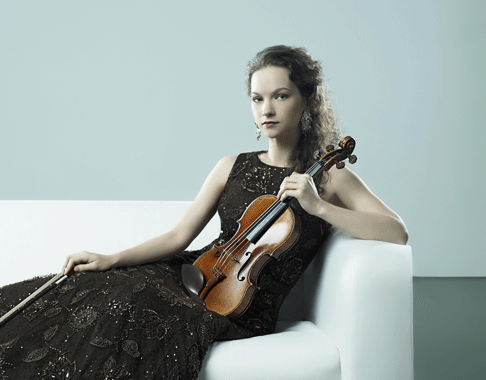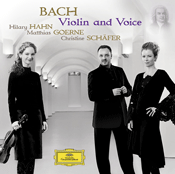Her discography
began in 1997 with a CD of the second half of the Sonatas and Partitas
of Bach, and also includes a disc of Bach violin concertos with the Los Angeles
Chamber Orchestra. Except for the Bach solos, and a disc of Mozart sonatas with
piano, she has appeared as a concerto soloist, so her most recent release is a
radical departure. Her vocal collaborators are not known as early music
specialists, but the continuo section includes three figures with extensive
work in the area — Naoki Kitaya, harpsichord and organ, Rosario Conte,
theorbo, and Kristin von der Goltz, violoncello (a former member of the
exceptional Freiburger Barockorchester, directed by her older brother
Gottfried.
We spoke by telephone on January 6, 2010.
TM: In the context of a disc of Bach arias, it seems to make sense to ask
“Were you brought up Lutheran?”
HH: Yes.
TM: So this repertoire fits in with what you heard as a child.
HH: Absolutely. My dad sang in a church choir, so there was a lot of this
music around the holidays. I was familiar with the vocal ensemble repertoire
from an early age.
TM: I know this a project you have been thinking about for quite some time.
Did you build the program around the texts of the arias, or were they chosen
more for musical reasons?
HH: I wanted to leave the decision about what arias to include with the
singers. I like all of it, and wanted to do what the singers were particularly
excited by. It’s so rich. We began to narrow it down since there is more
than could fit into one album. I became more conscious of the words as I
learned the music. In this repertoire I have to make the violin match the vocal
parts, but also remain true to the instrument. It doesn’t work to just
copy what the vocalists are doing — it has to be translated into a
violinistic context, to make it work musically without the words. It was
important to learn the notes first, and then the words, and then put it all
together.
TM: Bach’s musical interpretations of these fraught texts are
fascinating. So many of the texts in your CD are similar in tone to that from
BWV 158 [Der Friede sei mit dir] — “Welt, ade, ich bin
dein müde” — “goodbye, cruel world”, to put it in
modern terms. Perhaps this has to do with the way that Bach looks at the violin
— a heavenly sound, in that sense. The arias are so tightly focused on
death. Was that present for you, as you went through the project?
HH: I can look at it from the perspective of the words, or from the
perspective of the notes. The words don’t determine everything about my
interpretation. For a singer, the tone and articulation are determined by the
consonants and vowels in a word. It’s less so for the violin, but I have
to know that they are in order to match the singers. I was involved with
interpretation from the literary, but also separated from that to go back to
just the notes.
TM: You remarked in your video on the project about how singers sing, how
singers phrase, and how singers relate to other musicians. Could you expand on
that a little?
HH: Singers are very close to their instruments — you can’t
switch your instrument — you’ve got what you’ve got. You live
with that instrument and know it inside and out, it’s part of your body.
It’s a different relationship with the instrument than an instrumentalist
has. You can leave your instrument for a day, and go out and do something else.
For singers the limitations of the human voice have much to do with how things
are written for the voice, what the repertoire is, what singers take on. The
voice that a singer has determines what kind of musician they become. A man can
play a violin, and a woman can play a cello, but a woman can’t sing bass.
On the interpretive side the singer has to think about getting the meaning of
the words across, and the meaning of the notes. An instrumentalist has
technical things to keep in mind as you play, but for singers you have a
combination of theater and musical interpretation, theater in the sense of
projecting the words in the right way. We forget how often we hear things in
languages we don’t know in classical music.
 Hilary Hahn [Photo by Olaf Heine courtesy of Deutsche Grammophon]
Hilary Hahn [Photo by Olaf Heine courtesy of Deutsche Grammophon]
TM: Christine Schäfer remarks that Bach’s vocal lines are almost
unsingable because there is no space for a breath. Do you find things that are
similarly awkward in his writing for violin?
HH: Absolutely, though not something as basic as that. It is tricky to play
Bach well, because it is exposed and complex — that combination can be
treacherous, but at the same time it is extremely rewarding. You have a lot of
options as well. You can play it any which way, as long as it is convincing for
the listener. There are many different styles of performance for Bach, and they
all have their place.
TM: Bach survives best from the baroque because he is so open to modern
performances, much more so than his French contemporaries. There are certainly
pieces where Bach is writing against the instrumentalist, as Richard
Taruskin has written about. A good example can be found in the St. John
Passion, where he writes two baroque flutes in unison in a difficult key,
in order to show them that this is something they just can’t do. Even if
they try, it will be uncomfortable. Were there moments where you found he was
writing against your best intentions?
HH: There are ways of playing the arias that are easier than others, and
that has to do with tempi, and bowings. Sometimes what works best for the voice
doesn’t work best for the instrument, but in that case the singer should
take precedence. I wanted to make sure the singers did things the way they
wanted to, because I could always adjust.
There are certain passages that seem easy enough listening to them, but they
are awkward — awkward at a certain speed, awkward with a certain
interpretation. But it’s that way with everything. I don’t think
there is a single piece I have played that just fits like a dream. You figure
out how to make it work for you, how to bring it across to the audience
effectively, and there is a certain amount of molding yourself to the piece
that goes on. Once you do that, then you can feel comfortable with it. I feel
that if it feels awkward and weird and uncomfortable, maybe it’s not
there yet — maybe there is another way to work it out. It may not be a
way that you do naturally, so then you have to learn it, and then you can go to
the next level with it.
TM: This is perhaps what makes him German, rather than Italian. Italian
music tends to be written with the instrument in mind, what it can do, what it
can’t do, rather than to give it an idiom that is intrinsically
difficult.
HH: I like that challenge, though, because it makes me question how I
approach the instrument and the music, and it will give me references about how
to approach something that might be problematic in the future. The more I am
challenged, the more solutions I come up with, the more I feel I know my
instrument. If everything fits that well, I wouldn’t feel like I had gone
to some limit and pushed a little bit past it.
TM: You have said Bach has a spiritual effect on people.
HH: No matter where I am playing, at a school, at a Q& A session, in a
concert hall, whether it’s solo, or chamber music, or a concerto, it
changes the feeling in the room — everything gets really focused. The
music changes people’s states of mind. There’s a meditative
focus.
TM: Can you step back from the music and observe what is going on?
HH: You can tell what is happening in the room. Bach takes a lot of
concentration for an architecturally sound interpretation, so there is that
kind of focus, but I can tell what kind of response there is.
TM: Is there one of these arias in particular that changed your approach to
Bach?
HH: It was more of a development than a series of “ah-ha!”
moments. I have always thought of the Bach solo violin repertoire as vocal.
TM: Your training comes from the Russian and Franco-Belgian schools, but
this repertoire has been informed by those using period instruments. Was this
something that was in your ears in making the CD?
HH: I am sure — I have heard so much Bach on period instruments, and I
have so much respect for that tradition, the scholarship on performance, but I
haven’t been trained in it, and I am not one to jump into something with
knowing what I am doing in the area. I learned a lot from the musicians on the
project who come from that approach. They were amazing, and answered a lot of
questions I had, and helped me with decisions on interpretation. It’s
been influential for me, but I don’t play in that style because I have
enough respect for not to simply jump in.
TM: Is that something you see in your future?
HH: I would have to stop and study it for a few years in order to have that
knowledge. I don’t see it happening, logistically. I take what I like
from what I hear, and my preferences change as I change.

